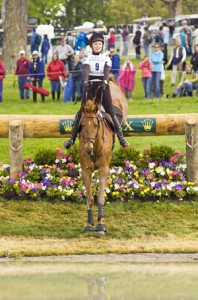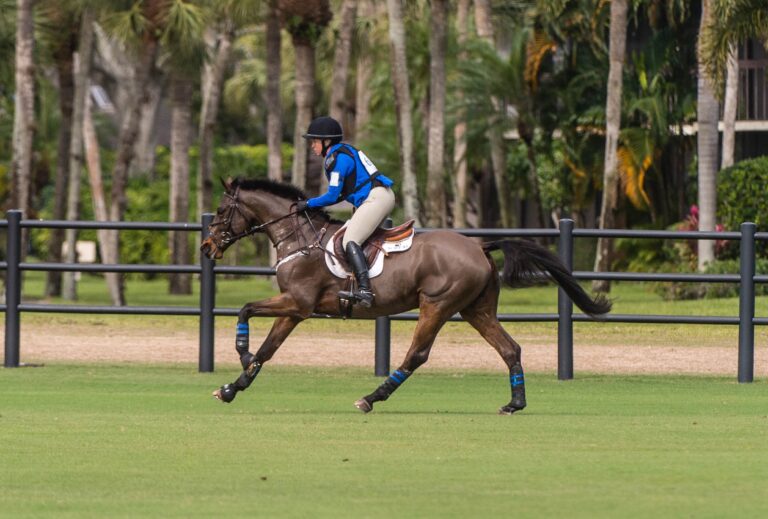Eventer Debbie Rosen knows what it’s like to be afraid. An equestrian for 40 of her 49 years, she says her current equine partner, The Alchemyst, “scared the hell out of me initially.” But he also gave the Calabasas, California, resident chills the first time she saw him five years ago, and there was no shaking the attraction. Even after she decided not to buy the extremely athletic Canadian Sport Horse, supportive clients thought the two belonged together and gave him to her as a gift.
 Debbie Rosen and The Alchemyst | © Michelle Dunn
Debbie Rosen and The Alchemyst | © Michelle DunnAt the outset of their partnership, the horse—who goes by the nickname Albert—”was way harder than I thought he’d be,” Debbie recalls. “He’s still way harder than I thought. I’ve probably come off him more than all the times in my career I’ve come off a horse. But he’s amazing.” He has a willingness to get better, she adds, and his unquestioning bravery cross-country is worth every moment of trepidation she may feel.
Together Debbie and Albert have progressed to the elite levels of their sport. In April they competed at the 2010 Rolex Kentucky Three-Day Event. Their finish—though well out of the top spots—was seen as a courageous victory by many. Shortly after the 2009 edition of Rolex, Debbie was diagnosed with breast cancer. A relatively aggressive form, it required multiple surgeries. During the first procedure in August 2009, her right breast and 16 lymph nodes from her right arm were removed. Then came a course of chemotherapy that wasn’t completed until March, just weeks before this year’s prestigious four-star event.
“Albert was completely different after my first surgery,” Debbie says. “He was an absolute saint. I had some help with his hacking, but I figured if I was going to continue to compete, I needed to do the work” which is exactly how she has approached her entire equestrian career.
Giddyup, Go!
Raised in suburban Los Angeles, Debbie always wanted to be involved with horses. Though her parents failed to share her passion for all things equine, they gave her her first pony when she was 10. “Fortunately, my parents thought that lessons would be a good idea, too, and I landed with veteran horsewoman Cory Walkey, who now owns the very high profile Mill Creek Equestrian Center, in Topanga, California,” Debbie says. “I was very fortunate to be in an environment where safety was stressed. That’s also where I learned about eventing. Very quickly it became the only sport I wanted to do.”
While still a student, Debbie began covering the not-inconsequential cost of her growing horse habit. She acquired mounts that were “cheap or that nobody else wanted or could ride,” she says. “I spent the first half of my career on horses that probably shouldn’t have been there. There were horses I wouldn’t ride today.” Eventually, she says, “I learned that just because you can ride it, doesn’t mean you should. I got a couple to Advanced by the skin of both our teeth. When you can, you learn to choose better.”
Debbie attended the University of California, Davis, as well as UCLA, but stopped short of earning a degree. The demands of a full college course load, full-time horses and a full-time job simply caused her to run out of steam. She worked in television production for a number of years while teaching lessons part-time. Then an inexpensive Quarter Horse came her way, and Debbie began making the transition to professional horsewoman. A lead pony at the racetrack, he was notorious for bucking off outriders and darting around expensive 2-year-olds. “They ditched him pretty quick,” she says, “and I made him an Advanced horse, though he probably shouldn’t have been. At about that same time, I was getting involved with some pretty long-term jobs at work, and they were taking me away from the horses. It was time for me to make a decision. I chose the horses full-time and never looked back.” Her company, Wild Ride Eventers, has been up and running for 20 years. It offers eventing training, boarding and horses for sale.
The Big Time
It took a decade for Debbie to find her first great horse, the one who would carry her to her first Rolex. “His name was Gringosch,” she says. “He was in Germany, and I must have maxed out five credit cards to get him. It was very foolish, but Josh ended up being the horse who got me into the three- and four-star world. He was amazing.
“By the time I reached the three-star level, I realized how different those horses are,” Debbie continues. “And I’m not talking about how much they cost. A horse who wants to go out and run a three- or four-star course is just a different animal. He’s unimpressed by the things that faze most horses. He’s far above the rest in terms of bravery, confidence and talent, and he possesses a certain type of psychological makeup that lets him get through something as challenging as that.”
Debbie and Josh made their first and only attempt at Rolex in 2004. They failed to finish when he lost a shoe. After returning home, Josh suffered a serious tendon injury in his stall. “He had more than a year off and he healed completely,” Debbie says. “I was told he probably could run again, but I just didn’t have the heart. Still, he wouldn’t retire gracefully. I can’t put anyone on him because he’s quite a beast, but my assistant adores him. She has been competing him at the lower levels—no higher than Preliminary—as well as Third Level dressage.”
Enter Albert
When Debbie lost Josh as an eventing partner, “I thought, OK, I’ve had my shot. I’ll be grateful for that,'” she says. “There aren’t many older women, compared to men, at the upper levels of this sport, and I had gotten there so late in life. I had really given up on the idea that I would find another horse as amazing as Josh.”
But fate and clients the Shevins family, whom Debbie considers part of her family, intervened.
In the midst of researching sale horses for another client, Debbie discovered Albert online. He was 6 at the time and featured on eventer Doug Payne’s DPEquestrian.com website.
“He had just come in fourth at the Morven Park one star,” Debbie recalls, “and I thought, ‘Oh my God, I have to look at this horse.’ So I went and rode him, but as much as I loved him, I passed. He’d been ridden by two men: Buck Davidson started him and Doug took on the ride after that. I couldn’t stop wondering,’What makes me think I can ride this horse that these two were riding?'” Then Albert’s owner called and offered to let Debbie take him for six months and compete him.
“I’ve been in the business a long time and that just doesn’t happen,” she says. Even better, Debbie’s “like family” clients arranged for her to have Albert as a gift. “We really want to do this for you,” they said. She couldn’t turn them down.
Over the years, Albert has gotten better, Debbie says, “but he’s still rank at 11. I’ve always loved him because he’s affectionate and sweet, but early on he absolutely terrified me. To my mind, you can’t begin to correct or change a horse until you can stay on through the corrections. In the beginning—and lasting until my surgery in 2009—I couldn’t stay on him through the corrections.
“He’s got the buck from hell,” Debbie continues. “He can leave the ground and buck in the air over an oxer, and you hit the ground before he does. I don’t ever think he bucks to be malicious. He’s just very athletic.”
That athleticism and an intense love of cross-country seem to serve Albert well. “You could light one of the jumps on fire, and he’d just go, ‘OK, let me figure this out.'” He appears to be as much of a competitor as his rider, and she believes he isn’t satisfied with any effort that falls short.
“This time at Rolex, we had our first stop and Albert doesn’t stop,” Debbie explains. “He jumped the ditch very big, and I think that’s where he pulled his shoe. He landed hard and without any room to negotiate the step to the narrow out. He did us a favor and he stopped, but you could tell he was mortified.”
It may not have been what they expected, but the stop failed to diminish the significance of their performance.
In Stride
Many at Rolex who knew of Debbie’s bout with breast cancer wondered whether the effects of chemotherapy would take their toll and leave her feeling worn out. But they needn’t have worried. “I felt great at the end of cross-country,” she says, in fact, better than she’s ever felt at the conclusion of an event. “I didn’t feel tired.”
That’s not surprising coming from a woman who, throughout the last year, has maintained a matter-of-fact approach to her medical condition as well as a fervent desire to continue to participate in international-caliber eventing. From the moment her cancer was diagnosed, Debbie has done whatever she could to deal with it on her terms. That includes scheduling her mastectomy for August because she had planned to ride in the July 2009 Event at Rebecca Farm in Kalispell, Montana.
After the surgery, “everything, from simply getting on and off, had to be changed at least initially,” Debbie says. “But I actually competed Albert between chemo treatments four and five. The season opener at Galway Downs in Temecula, California, fell at a good weekend chemo-wise, so I got to ride him there.” They finished an impressive third out of 21.
Debbie is grateful to her approximately 25 clients and staff for accommodating her schedule and needs during treatment. “I have a wonderful assistant and a terrific young lady who is basically volunteering for school credit,” she says. “Fortunately, much of what I needed to do medically happened during the winter. We weren’t competing, so it was easy to take off two days a month and exchange those for other days that I might not normally have worked. It also helped that I have a very autonomous clientele. I don’t have anyone who could not ride their own horse when push came to shove. They are very hands-on people who also like to ride really early in the morning. I couldn’t do really early in the morning sometimes, and they were more than happy to change. Everybody was just fantastic.”
Ride On
With their second Rolex appearance behind them, Debbie says she and Albert are living their dream and have their sights set on the Land Rover Burghley Horse Trials in the near future. “Albert and I would love to go to England,” she says. “I finance most of this on my own, so I’m still trying to decide if maxing out my credit cards is the appropriate way to get to Burghley at my age. I have a feeling that’s ultimately what I’ll end up doing. It’s a dream I haven’t yet dared to envision fully. Just to go there and go down the centerline would be phenomenal.
“This is my sport,” Debbie continues. “This is what I love. Yes, Albert is difficult. I think they’re all difficult at this level. He’s so talented. I love the ride on him, and because of the progress we’ve made, I’m certainly less afraid. The positives far outweigh the negatives,” she says, “and I think I’m doing so well because of the way my life is” cancer and all. “I don’t want to change that.”
This article originally appeared in the August 2008 issue of Practical Horseman magazine. Debbie demonstrates how to introduce your horse to corner fences in the November 2012 issue.










